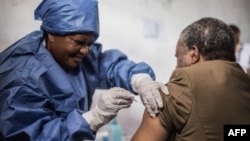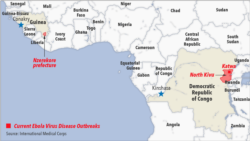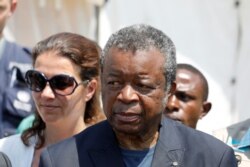With the Ebola virus flaring in the Democratic Republic of Congo and a new outbreak in Guinea, Dr. Jean-Jacques Muyembe Tamfum is worried.
“This is a great concern for us, especially since the COVID and Ebola crises are occurring” simultaneously, said Muyembe, who manages DRC’s National Institute of Biomedical Research and is coordinating his country’s responses to both infectious diseases.
A renowned expert on the Ebola virus, the 78-year-old microbiologist sees it as a more urgent threat than COVID-19 in his country. Meanwhile, the pandemic’s official death toll in Africa has surpassed 100,000.
“Ebola must quickly be contained,” said Muyembe, interviewed via Skype from his Kinshasa office last week. “… Then, we will be able to deal much more seriously with COVID-19. So, the priority is first Ebola and then COVID.”
Ebola, a viral hemorrhagic disease that can cause severe bleeding and organ failure, resurfaced in the DRC’s northeastern province of North Kivu on February 7, with seven confirmed cases and four deaths as of Monday. A new outbreak in southeast Guinea, announced February 14, has brought four confirmed and four probable cases, including five deaths. It is that country’s first outbreak since June 2016, when the world’s worst one ended after more than two years. It killed more than 11,300 people, mostly in the West African nations of Guinea, Liberia and Sierra Leone.
In past Ebola outbreaks, anywhere from 25% to 90% of infected people died, the World Health Organization reports. By comparison, the overall mortality risk of COVID-19, a respiratory disease, is 1% or less, but rises with age and risk factors, according to Johns Hopkins University researchers.
Long experience with Ebola
Muyembe has been studying the Ebola virus ever since he first laid hands on it in 1976. While investigating a mysterious outbreak near the Ebola River in northern DRC, then known as Zaire, he collected blood samples from ailing villagers.
“Back then, we used our bare hands,” with no gloves to hold a syringe, he said in an interview for the Bulletin of the World Health Organization in 2018. In retrospect, he called his survival “extraordinary. If I had not washed my hands, I would have died.”
That was the first known Ebola outbreak. The DRC has experienced at least 11 of them, more than in any other country. Outbreaks occur in the Central African nation of 105 million because of people’s proximity to wildlife. The Ebola virus is believed to jump from animals, such as bats or monkeys, including when they are consumed as “bush meat.”
It spreads among humans through direct contact, including through traditional burial customs that involve handling the body.
Muyembe said the resurgent virus is linked to an outbreak in the conflict-plagued northeastern provinces of North Kivu, South Kivu and Ituri that was declared over last June after 22 months. More than 3,400 cases were confirmed, with nearly 2,300 deaths, making it the world’s second-largest outbreak ever.
One of the new DRC fatalities is a North Kivu woman in her 40s whose husband survived a 2020 infection. The virus, which spreads through direct contact with an infected person’s bodily fluids, has been detected in some survivors’ semen and eye fluid. Muyembe said the husband “has tested negative for several months since September” and “is still negative.”
Yet the genetic sequencing done by the institute’s lab shows a connection between the virus that killed the woman and the earlier outbreak, the Congolese microbiologist said.
“We are really sure of that,” he said. “Which means that the epidemic has developed quietly without us being able to detect it as soon as possible. … How this outbreak has remained silent for over six months is a question mark.”
New tools to combat Ebola
Some positive developments in Ebola prevention and treatment emerged, Muyembe noted, citing vaccines and drug therapies.
“We have the tools to vaccinate and to treat the sick. Thus, we break the chain of transmission, and the virus can go back into the forest,” he said.
In late 2019, the World Health Organization (WHO) and the U.S. Food and Drug Administration (FDA) approved Merck's Ervebo, a one-shot vaccine. Last July, the European Commission approved a two-dose regimen – of the vaccines Zabdeno and Mvabea – from Johnson & Johnson's Janssen division.
Gains also have been made in treatment. Late last year, the FDA approved two therapies for treating Ebola infections: Regeneron Pharmaceuticals' antibody cocktail Inmazeb and Ridgeback Biotherapeutics' human monoclonal antibody Ebanga. The DRC institute worked with the U.S. National Institutes of Health to develop the latter, Muyembe said, noting that his team revisited promising research that Western partners had asked them to set aside more than a decade ago.
The institute has sent some of the treatment to North Kivu, Muyembe said, and “we will also send some shipments to Guinea to treat the sick. This is something we can do in the framework of African solidarity to help our friends in Guinea.”
He added that Congolese health experts also would be sent there.
Distribution of the Ebola vaccine is targeted, not widespread, as is planned for COVID-19 vaccines. In part, that is because Ebola spreads through direct contact; COVID can spread from an infected person through droplets that hang in the air and are harder to avoid.
“If you’re spending money manufacturing vaccine and getting it into the arms of every person in a given country, that’s money that’s not being spent on something else that’s way more common, like (the) measles vaccine, or even other non-health-related issues,” Tiffany Harris, an epidemiology professor at Columbia University Medical Center in New York, told VOA.
Raising awareness
Muyembe made a point of getting a shot in front of news cameras as soon as the Ebola vaccine was available. He will do the same with a COVID-19 vaccine, he said, to bolster public awareness and to allay suspicions of a Western ploy to sterilize or otherwise harm Africans.
Misinformation is “amplified here in Africa,” Muyembe said. “It is up to us to convey the true messages of peace and security” to get people “to accept the COVID vaccine. But it's not easy.”
Health authorities have ramped up public awareness campaigns in Ebola-affected areas, joining much broader COVID-19 awareness campaigns on radio, social media and other platforms throughout Africa.
“You can end an epidemic, but you cannot end the virus,” Muyembe said of Ebola. “… It can come back, so we have to be vigilant.”
Adam Phillips of VOA’s English to Africa Service contributed to this report.






